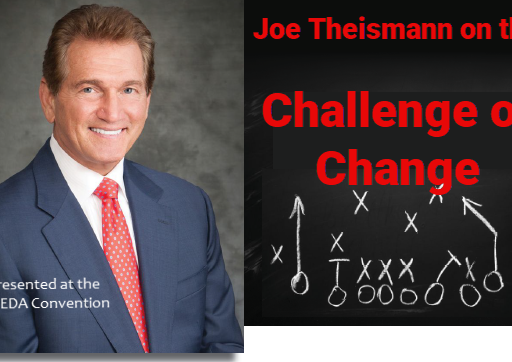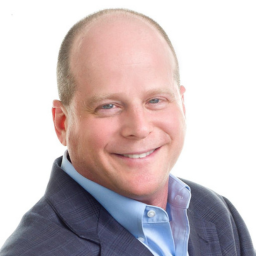Joe Theismann on the Challenge of Change
By Nicole Needles
On November 18, 1985, he was the starting quarterback of the Washington Redskins. Later that same evening, he was a hospital patient getting treatment for his shattered leg. Joe Theismann recalls his career-ending injury: “You don’t get much more of a sudden life change than that.”
In the realm of American football, few names resonate as strongly as Theismann’s. He not only left an indelible mark on the sport with his on-field prowess but also emerged as a beacon of resilience and adaptability in the face of life’s challenges. Beyond the gridiron, Theismann’s journey serves as a testament to the transformative power of a positive mindset and the ability to navigate change with grace.
A Foundation of Mental Toughness
“You work on the things as life presents those issues and challenges to you. You have to have a great foundation to be able to go forward,” Theismann said. “It’s like I tell people all the time, ‘the Great Pyramids were not built on their point. They’re built on a foundation.’ And that’s sort of the way I look at our lives and the way you have to be able to approach life when you deal with challenges and you deal with change.”
In his book, “How to be a Champion Every Day,” Theismann explores the parallels between the worlds of sports, business and personal life. At its core lies the concept of mental toughness — a quality he believes is paramount in dealing with change. Theismann shares, “The number one most important thing is mental toughness. People deal with change in different ways. As you move through different aspects of your life, you’re going to have to deal with change. But you have to be true to yourself.”
Defining Success on Personal Terms
Success is different for everyone. You have to decide what it means for you. Theismann’s journey began with a childhood idolization of Joe Namath, a quarterback who seemed larger than life. Growing up in New Jersey, Namath was Theismann’s world, and emulating him became a driving force. However, as he transitioned to professional football, Theismann realized the importance of authenticity. He now emphasizes the need to be true to oneself as the foundational aspect of facing life’s challenges.
“The things that we’re talking about, the challenges that you face, the changes that you go through, they’re very personal,” he said.
He underscores the personal nature of the definition of success, acknowledging that it varies for each individual. Theismann encourages people to reflect on their values and personal goals to establish their unique benchmarks for success.
Navigating Change
At the MHEDA Convention, Theismann will highlight the importance of maintaining a positive mental outlook and mental toughness in the face of difficulties. He stresses that it’s not merely a mindset shift but a developed mindset applied to various challenges. Change, in Theismann’s view, is an opportunity to be sought rather than an obstacle to be feared.
“It’s a mindset that you develop. You start to apply that mindset to different aspects and elements of the challenges that you’re facing. I refer to change as an opportunity. When we have a change in our life, that’s an opportunity,” Theismann said.
He shares wisdom from his mother, “Go look for the good in people, and you’re probably going to find it.” Applying this philosophy to change, Theismann encourages individuals to focus on the positive aspects, considering the opportunities that come with life’s transitions. This positive approach, he believes, is crucial in overcoming challenges and embracing change as a catalyst for personal growth.
Rebuilding Personal and Professional Life
Following his injury, Theismann learned the importance of diversification and exploring varied interests — or as he puts it, not “hitching yourself to one horse.”
“It gave me a chance to expand myself mentally. It allowed me to be able to not just totally be consumed by my job of a football player, but to think about broadcasting, the restaurant business, the investments that I’m involved in,” he said.
He advocates for individuals to avoid tethering themselves to a single path. Theismann believes that cultivating interests beyond one’s current occupation is essential for personal development and resilience. Diversification, in his eyes, provides a mental escape from the confines of a singular focus and opens doors to new possibilities.
“I can’t see people moving forward unless they develop an interest in something other than where they are. Whatever it might be. You want to expand your knowledge as much as you can,” he said. “I just think that education, and I don’t mean formal education necessarily, I mean education and different aspects of life allows you to be able to deal with challenges and changes a lot better than if you’re just centrally or singularly focused.”
Overcoming Misconceptions About Change
Addressing misconceptions surrounding change, Theismann challenges the notion that it is inherently negative. Drawing from personal experience, he argues that change can be an opportunity for growth.
“Are you going to approach it as an opportunity? Or do you approach it as a disaster?” he asks.
Theismann’s resilience in the face of adversity serves as a living example of embracing change as a transformative force.
During his presentations, he shares stories of sudden changes in his life, emphasizing that change, whether anticipated or unexpected, can be a stepping stone to personal and professional evolution. His message is clear – the mental approach to change determines its impact, and viewing it as an opportunity rather than a setback is key.
“There are two things. You can either you can crawl up in a ball and go sit on a couch and turn the TV on and just wilt away. Or you can take the bull by the horns and say this is not going to get me down. This is one step, one opportunity for me to be able to move forward.”
Advice for Those Facing Career and Life Transitions
For individuals navigating significant career and life changes, Theismann offers practical advice based on his own experiences. He suggests diversifying interests and expanding one’s knowledge beyond the current occupation. In a world that often emphasizes singular focus, Theismann encourages individuals to explore diverse areas, whether it be arts, education or personal hobbies.
“I think so much of life is mental. It’s the way we approach our lives. You have to look inside yourself. You can create your own misery, or you can create your own happiness,” he said.
Theismann’s holistic approach to personal and professional development resonates with those seeking guidance during transitional phases.
Supporting Others
Reflecting on his own injury recovery and life changes, Theismann discusses his interactions with others facing similar challenges. Notably, he mentions spending time with Alex Smith, another NFL quarterback who faced a life- and career-threatening injury, and offering support to those undergoing physical rehabilitation. His support for Smith was one of the factors that resulted in him continuing his football career and retiring from it of his own will rather than because of an injury. Not only did he overcome his injury, he won NFL Comeback Player of the Year in 2020 after leading Washington to the playoffs.
“The story of Alex Smith is not the story of an athlete. It’s the story of a man who decided not to allow someone to tell him that he couldn’t do something,” Theismann said.
His conversations with individuals going through various life changes extend beyond the football field, showcasing a compassionate and empathetic side. Theismann recognizes the value of sharing experiences, providing guidance and fostering a sense of community for those navigating their unique journeys.
Looking Forward with a Positive Outlook
When asked if there is anything he wishes he had known or done differently during his injury recovery, Theismann remains steadfast in his forward-looking approach. He identifies as a “windshield guy, not a rearview mirror guy.”
His commitment to continuous learning, personal growth and an optimistic outlook underscores the essence of his resilience. Theismann’s journey serves as a reminder that life’s challenges are not roadblocks but opportunities for self-discovery, transformation and humility.
“We build ourselves up, and people build us up. We start believing those headlines. They don’t have to be written headlines, they might be headlines in our minds, and we start believing them. Then all of a sudden, bang, something changes and you’re not equipped to be able to gain humility.” he said. “Mike Tyson once said ‘If you don’t find humility, life will find it for you.”
Joe Theismann’s story transcends the boundaries of sports, resonating with anyone navigating the complexities of life and change. His insights, grounded in authenticity, mental toughness and a positive mindset, offer a roadmap for individuals seeking to build resilience, redefine success and embrace the ever-evolving journey of personal and professional growth. Theismann’s legacy extends beyond the football field, leaving an enduring impact on those inspired by his champion’s mindset.




